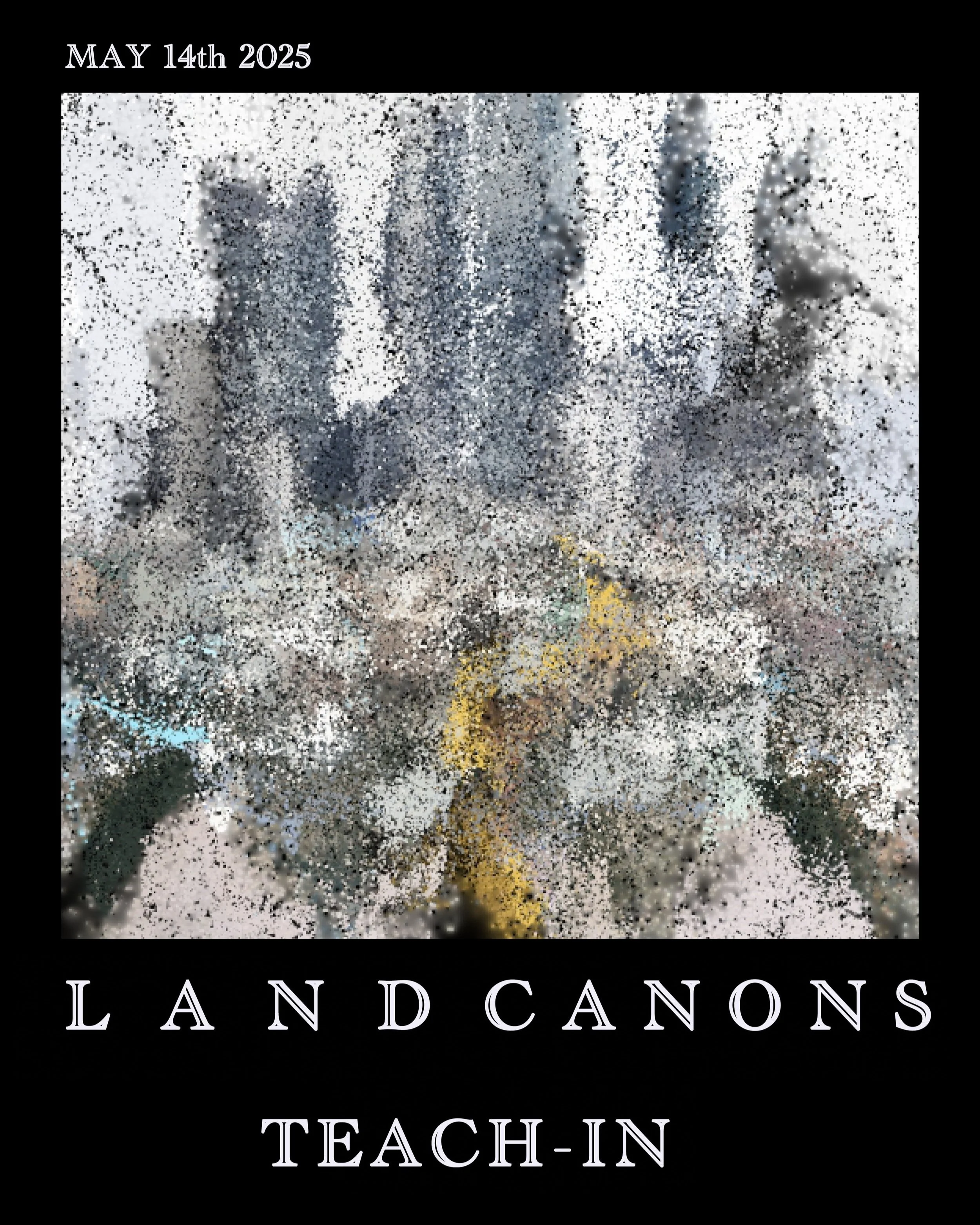
Join us for the final presentation and public Teach-Ins for Land Narratives + Formations for A Just City, led by Professor Toni L. Griffin.
Wednesday, May 14th
9:00 AM – 5:00 PM
Harvard GSD, Gund Hall, Rooms 124 and 121
Throughout the day, students will lead six dynamic sessions exploring diverse geographies of land erasure and resistance through the lens of justice, memory, and reimagination. These interactive teach-ins draw from the collaborative work of the class and launch LANDCanons, a call to action to reclaim and rewrite land narratives for a more equitable future.
9:00 – 9:30
Welcome - LandCanons Project and Teach-In Overview
9:30 – 10:20 The Land as Palimpsest: Conflict, Memory, and Transformation in Berlin, Eva Cao. Porticos 124
This project uses Berlin as a palimpsest to explore how layers of history, memory, and urban transformation continue to shape the city’s present. Through a three-tiered shelf installation, it visualizes key motifs—monuments and counter-monuments, Ostalgie narrated through digital immersion, and street art as protest—revealing the tensions of identity, erasure, resistance, and gentrification. The work embodies themes of layering, transparency, and hauntology to reflect Berlin’s complex land narratives.
10:20 – 10:30 Break
10:30 – 11:20
Steel Rails to City Streets: Chinese Migration and the Infrastructures of Urban Development, Savannah K. Cheung, Porticos 124
This project traces the entangled histories of Chinese migration and American infrastructural development, from the labor camps of the Transcontinental Railroad to the vibrant yet vulnerable Chinatowns shaped by modern urban renewal. Through immersive storytelling and the creation of exhibition artifacts, the project brings to light the often erased narratives of Chinese laborers. Their work fueled national expansion and urbanization, yet their communities were systematically excluded and displaced. Subtle shifts in visibility suggest tensions between erasure and presence, resilience and redevelopment. Reflecting on how transportation infrastructure has simultaneously marginalized and made space for diasporic identity, memory, and resistance within the urban fabric.
11:20 – 11:30 Break
11:30 – 12:20 Dreams in Square Feet: Clinton Hill and the Price of Belonging, Cynthia (Siqi) Yang, Porticos 121
This project uses Clinton Hill, Brooklyn, to explore how the American Dream has been reshaped by land, policy, and people. Once a symbol of opportunity, the neighborhood now tells a more complicated story. Rising property values stand alongside stagnant futures for longtime residents. Through historical research, data visualizations, and a narrative play, the project reveals land as both a ladder and a barrier—showing how today’s American Dream feels more conditional than ever.
12:20 – 1:30 Lunch, Room 518
Afternoon Session
1:30 - 2:20 Truth, Memory, and Reconciliation: The Biafran War & a Case for National Healing, Schola Chioma Eburuoh, Porticos 121
An interactive storytelling project that invites participants to engage with overlooked histories and innovations from the Nigeria-Biafra War. Through a collaborative puzzle, each piece unveils a story of resilience, ingenuity, or survival — drawing connections between memory and national healing. This project challenges silence by transforming fragmented narratives into a shared act of truth-telling.
2:20 - 2:30 Break
2:30 - 3:20 Stories Under the Concrete: City, Community, and Change in Shenzhen Urban Villages, Zelin (Elly) Li, Porticos 121
Amid Shenzhen’s rapid urban transformation, this project explores the layered narratives of its urban villages—spaces shaped by both state-led redevelopment and everyday adaptation. The project reveals how these villages embody both memory and possibility within a city built on reinvention.
3:20 - 3:30 Break
3:30 – 4:20 Wartime Peacetime: Tokyo, Japan A Critical Examination of Urban Destruction, Bolade Elijah-Samuel Richardson Jr., Porticos 124
This project explores the cyclical transformation of Tokyo’s built environment—birth, life, and death—through key events such as the Great Kanto Earthquake, World War II, the economic bubble, and the Metabolism Movement. Through interactive storytelling and digital immersion, we will examine how both natural and man-made disasters have shaped Tokyo’s urban form and the architect’s role in creation and destruction. This project opens the door for reflective dialogue as it also considers broader geopolitical forces, including imperialism and nationalism in Africa, Asia, and the Pacific, to understand how architecture reflects global power dynamics
4:20 - 5:00 Teach-In Reflections
On behalf of the students of MDes Open Project: Land Narratives and Formations for a Just City, we invite you to our LandCanons Teach-Ins on March 11 & 12, from 2:30-5:30 PM. Through immersive storytelling, live podcasts, art-making, and theater, we explore land erasure, displacement, and the fight for just cities. Join us for engaging sessions like Land Jeopardy, Theater of the Oppressed, and more! Please share—all are welcome! Let us know if you can attend by registering below. Full schedule below.

